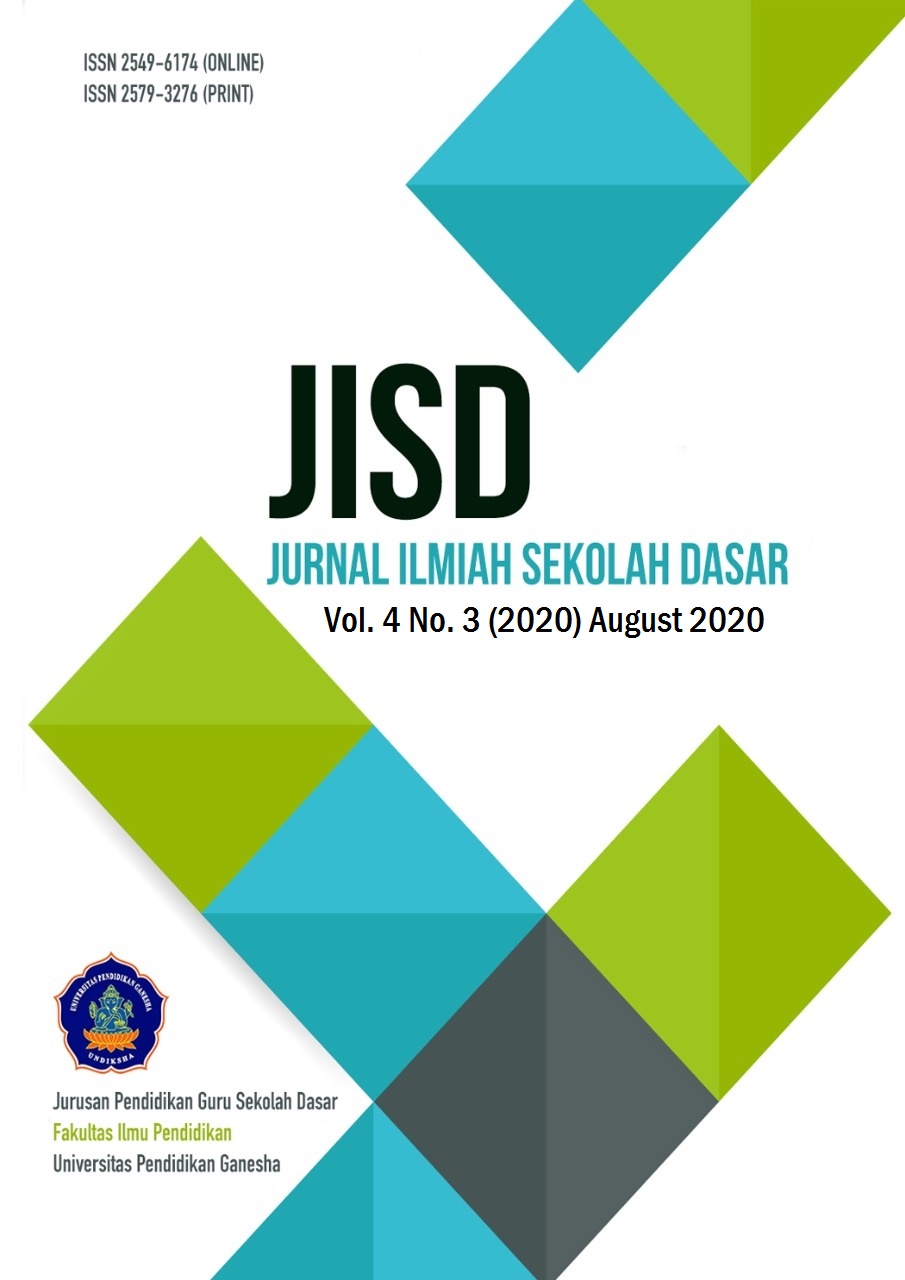The Role of Parents' Attention in the Moral Development of Children in the Amid of COVID-19 Pandemic
DOI:
https://doi.org/10.23887/jisd.v4i3.25536Keywords:
moral development of children, pandemic covid-19Abstract
The current covid-19 pandemic has caused the child's needs to be less fulfilled for the attention and guidance of parents, which will undoubtedly affect the aspects of children's moral development. This research was conducted to identify the role of parental attention in the moral development of elementary school children during the Covid-19 pandemic. This research uses qualitative methods with literature studies from several sources, both print and electronic media, as well as books and online journals. The research technique used is the documentation technique in the form of notes, books, papers or articles, journals, and news. Validity test, researchers used the triangulation of data sources. The literature review analysis uses the content analysis paradigma presentation of data using informal presentation methods. The results of this study are based on a survey from the Ministry of Education and Culture, namely that around 90% of parents accompany their children during SFH, and only 3,4% of children do not receive assistance from their parents because their parents work outside the home. This research concludes that it is essential for parents to pay attention to the moral development of their children, especially during the Covid-19 pandemic, in general, parents have played a role in accompanying their children during the Covid-19 and SFH pandemic.
References
Arief, L., & Sundara, T. A. (2017). Studi atas Pemanfaatan Blockchain bagi Internet of Things (IoT). Jurnal RESTI (Rekayasa Sistem Dan Teknologi Informasi), 1(1), 70. https://doi.org/10.29207/resti.v1i1.26
Asdiqoh, S. (2018). Peran Orang Tua Dalam Pemahaman Etika Sosial Anak. ThufuLA: Jurnal Inovasi Pendidikan Guru Raudhatul Athfal, 5(2). https://doi.org/https://doi.org/10.21043/thufula.v5i2.3477
Bahirah, A., Agustin, R. W., Setyowati, R., & Imaroh, T. S. (2019). Peran Regulasi Emosi dan Perhatian Orang Tua pada Social Problem-Solving Remaja yang Bersekolah Asrama. Indonesian Journal of Educational Counseling, 3(2), 139–146. https://doi.org/10.30653/001.201932.88
Gianoza, J. (2013). Hubungan Perhatian Orang Tua Dengan Moral Remaja. Konselor, 2(1). https://doi.org/https://doi.org/10.24036/0201321734-0-00
Hartati, T. (2019). Peran Orang Tua Dalam Membina Akhlak Anak Usia 5-10 Tahun (Studi Di Desa Pendingan Kecamatan Muara Lakitan Kabupaten Musi Rawas). Jurnal PAI Raden Patah, 1(2), 139–151. https://doi.org/10.19109/pairf.v1i2.3233
Hayati, A. A., DS, D. P., & Praja, E. S. (2019). Analisis kebutuhan perancangan aktivitas pembelajaran berdasarkan pada dimensi sikap moral bagi siswa sekolah dasar. Jurnal Civics: Media Kajian Kewarganegaraan, 16(1), 59–68. https://doi.org/10.21831/jc.v16i1.20487
Hidayatullah, N. A., & Juliando, D. E. (2017). Desain dan Aplikasi Internet of Thing (IoT) untuk Smart Grid Power Sistem. VOLT : Jurnal Ilmiah Pendidikan Teknik Elektro, 2(1), 35. https://doi.org/10.30870/volt.v2i1.1347
Kementerian Pendidikan Dan Kebudayaan: Orang Tua Memegang Peranan Penting dalam Pelaksanaan Belajar dari Rumah, (2020). https://www.kemdikbud.go.id/main/blog/2020/06/kemendikbud-orang-tua-memegang-peranan-penting-dalam-pelaksanaan-belajar-dari-rumah
Kurniati, E., Nur Alfaeni, D. K., & Andriani, F. (2020). Analisis Peran Orang Tua dalam Mendampingi Anak di Masa Pandemi Covid-19. Jurnal Obsesi : Jurnal Pendidikan Anak Usia Dini, 5(1), 241. https://doi.org/https://doi.org/10.31004/obsesi.v5i1.541
M Rahman, M. (2014). Peran Orang Tua Dalam Membangun Kepercayaan Diri Pada Anak Usia Dini. ThufuLA: Jurnal Inovasi Pendidikan Guru Raudhatul Athfal, 2(2), 285. https://doi.org/10.21043/thufula.v2i2.4241
Maharani, L. (2014). Perkembangan Moral Pada Anak. KONSELI: Jurnal Bimbingan Dan Konseling (E-Journal), 1(2), 93–98. http://ejournal.radenintan.ac.id/index.php/konseli/article/view/1483
Mawarsih, S. E., & Hamidi, N. (2013). Pengaruh Perhatian Orang Tua Dan Motivasi Belajar Terhadap Prestasi Belajar Siswa Sma Negeri Jumapolo. JUPE UNS, 1(3), 13.
Oktaria, R., & Putra, P. (2020). Pendidikan Anak Dalam Keluarga Sebagai Strategi Pendidikan Anak Usia Dini Saat Pandemi Covid-19. Jurnal Ilmiah Pesona PAUD, 7(1), 11. https://doi.org/10.24036/108806
Septiani, D., & Nasution, I. N. (2018). Peran Keterlibatan Ayah dalam Pengasuhan Bagi Perkembangan Kecerdasan Moral Anak. Jurnal Psikologi, 13(2), 120. https://doi.org/10.24014/jp.v13i2.4045
UNESCO. (2020). Education: From disruption to recovery. https://en.unesco.org/covid19/educationresponse
UNICEF, U. (2020). Belajar dari rumah selama pandemi COVID-19 | UNICEF Indonesia. https://www.unicef.org/indonesia/id/coronavirus/cerita/belajar-dari-rumah-selama-pandemi-covid-19
Yuliana. (2020). Corona Virus Diseases (Covid-19); Sebuah Tinjauan Literatur. Wellness and HealthyMagazine, 2(1), 6.
Zaharah, Z., & Kirilova, G. I. (2020). Impact of Corona Virus Outbreak Towards Teaching and Learning Activities in Indonesia. SALAM: Jurnal Sosial Dan Budaya Syar-I, 7(3).
Downloads
Published
How to Cite
Issue
Section
License
Authors who publish with the Journal Ilmiah Sekolah Dasar agree to the following terms:
- Authors retain copyright and grant the journal the right of first publication with the work simultaneously licensed under a Creative Commons Attribution License (CC BY-SA 4.0) that allows others to share the work with an acknowledgment of the work's authorship and initial publication in this journal.
- Authors are able to enter into separate, additional contractual arrangements for the non-exclusive distribution of the journal's published version of the work (e.g., post it to an institutional repository or publish it in a book), with an acknowledgment of its initial publication in this journal.
- Authors are permitted and encouraged to post their work online (e.g., in institutional repositories or on their website) prior to and during the submission process, as it can lead to productive exchanges, as well as earlier and greater citation of published work. (See The Effect of Open Access)










